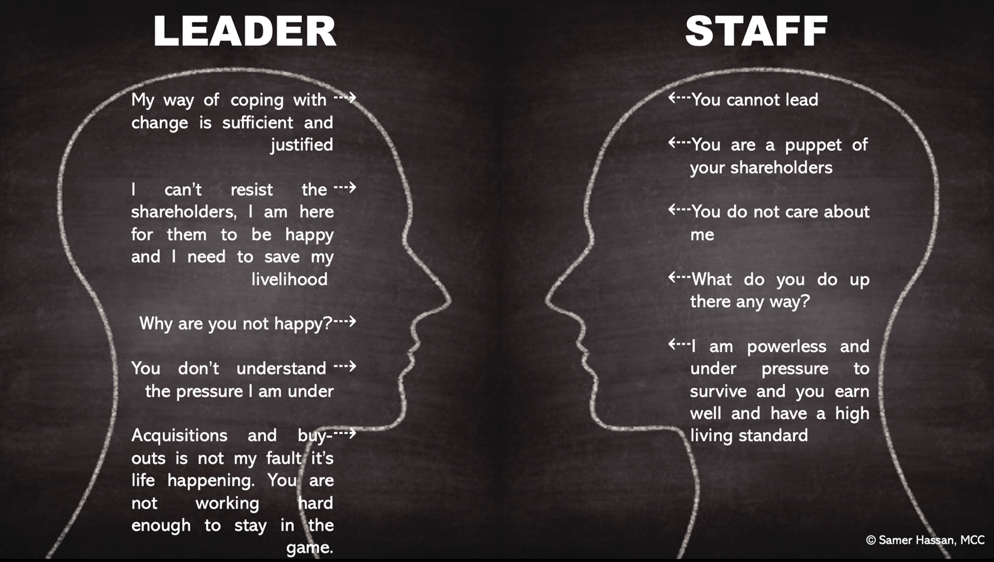Similar to any human, a leader’s mind roams between past, future and present when facing the unpredictability of the unknown. The issue is that the unknown is here to stay. It is the foremost constant. No matter how we try weaponizing ourselves with knowledge to defeat our fear of the unknown, fear will not go away.
Knowledge-based leaders are like cartographers who are driven to create a map towards the future to control outcomes with certainty. One look at the year 2020 to realize the undependability of such maps.
Autor: Samer Hassan, MCC
Leaders who managed to thrive in 2020 have proven to have a key leadership quality when facing the unknown: instantaneous adaptability. Adapting to what happens any moment is a quality embedded in a core ability that we all have. In fact, every creature on the planet has this ability. Yet, not every human knows how to access it by choice. We call this ability presence. While cartographers are busy mapping and predicting the unknown, presence-based leaders master the ability of being in the moment responding to what emerges in sync with what emerges.
Somatic Thinking promotes presence as a ‘way of being’ that enables leaders to become more of a RADAR without biases. Forming a holistic partnership of body and mind, Somatic Thinking enables leaders to sense what is emerging from a place of presence instead of being concerned with what may happen ‘then and there’. It equips leaders with the ability to respond promptly on interacting with what is ‘here’.
To be honest, we do not reinvent the wheel with Somatic Thinking. What we definitely do is upgrade the wheel. After all, presence and body-mind partnership in leadership are no new concepts. They are well established in psychotherapy (e.g. Reich, 1972. Röhricht et al., 2014), phenomenology (e.g. Merleau-Ponty, 2002), sociology (e.g., Waskul & Vannini, 2006b), bioenergetic science (e.g., Lowen, 1994; Cotter, 1996), and coaching (e.g., Silsbee, 2008; Jackson, 2017; Whitworth et al., 2007, Erdös, 2020). However, Somatic Thinking offers a fresh perspective on these concepts in how it rearranges the wisdom we inherited from western and eastern minds to pave a clearer path to presence that is simple, practical and in harmony with all cultural and religious belief systems.
Against this background radar leaders view a problematic phenomenon as a driving force that creates thriving through acceptance, adaptation, and transformation of what emerges into something different.
Radar leaders believe that when facing a problematic phenomenon, we need to:
- Let go of our biases,
- Sense what is happening like a radar will do,
- Interact with the problematic phenomenon to understand its flow and dynamics,
- Explore the possibility of transforming the energy of a painful phenomenon into an innovative solution,
- Take more informed action,
- Start again from step one and refine as we go.
A radar leader’s inner monologue usually goes something like, ‘My purpose is to consistently boost my ability to adapt, innovate and share with people to build a community that can continue adapting and innovating with me and long after me’.
A relevant EXERCISE
Based on authentic interviews recently conducted with leaders and HR representatives across a range of corporations by ICF Chapter Austria, both staff and leader perspectives have unveiled a series of issues corporations report to grapple with these days. These issues range from lack of trust in leaders, to crippling loyalty to organizations, to diminishing respect for leaders and leadership, to name but just a few.
Basically, when facing any such issue, a Somatic Thinker will start with a sincere reality check that we commonly refer to as ‘embracing the TAR’. I invite you to dare the jump into action with me to explore the TAR for yourself as a radar leader will:
Take a moment to reflect on how you behave with others when …
- Having deadlines to meet and objectives to deliver
- Facing too many changes in a short time
- Receiving pressure from your shareholders
- Noticing the unhappiness of your staff
Please, write down your answers before continuing to read.
Let’s listen to some thoughts that your staff may have about you, (caution: reality can be harsh, so be braced!)
- You cannot lead
- You are a puppet of your shareholders
- You do not care about me
- What do you do up there any way?
- I am powerless and under pressure to survive while you earn well and have a high living standard.
Question, honestly: is there at least one behavior of yours that may trigger any of these thoughts in your staff? Write them down please.
Now, read some thoughts that other leaders have had as they got triggered by their staff’s responses:
- My way of coping with change is surely sufficient and definitely justified,
- I shouldn’t resist our shareholders; I am here for them and I need to secure my livelihood,
- Why are you not happy?
- You don’t understand the pressure I am under,
- Acquisitions and buy-outs are not my fault; it’s life happening. You are not working hard enough to stay in the game.
Question, honestly, have you had at least one of these thoughts yourself?
To see the TAR clearly, and based on thoughts shared by staff and leaders in the interviews, let’s imagine how the unspoken dialog between them look like, behind the behavioral shields of smiles, politeness and nice words.
| ⇒ LEADERS | ⇐ STAFF |
|
⇒ My way of coping with change is sufficient and justified |
⇐ You cannot lead |
|
⇒ I can’t resist the shareholders; I am here for them to be happy and I need to save my livelihood |
⇐ You are a puppet of your shareholders |
|
⇒ Why are you not happy? |
⇐ You do not care about me |
|
⇒ You don’t understand the pressure I am under |
⇐ What do you do up there any way? |
|
⇒ Acquisitions and buy-outs are not my fault, it’s life happening. You are not working hard enough to stay in the game. |
⇐ I am powerless and under pressure to survive and you earn well and have a high living standard |

Can you see where the TAR is coming from?
- Facing this problematic phenomenon as a leader, what would you do to overcome it?
- What would a cartographer leader do?
- What would a radar leader do?
- At the end of this exercise, what did you learn about yourself? Your leadership?
Please, share with us some of your learning.
Tipp
If you find any of what I have shared with you of value and would like to learn more about how to become a radar leader, join my virtual workshop:
- workshop „shifting your leadership narrative“
- at the Leadership Intelligence 4.0 Conference
- 15th – 19th February 2021
- organized by ICF Chapter Austria.
- http://bit.ly/Leadership-Intelligence-2021
Guest-Author
 Shifting your Leadership Narrative
Shifting your Leadership Narrative
Samer Hassan, MCC: Growth Coach and Mentor: Serving coaches, leaders and organisations. Growing beyond your objectives is my craft and passion. I perceive myself as a nomadic coach who has the ease with which to crosse cultures, traditions, and beliefs. I work on four continents as an ICF Master Coach developing individuals and leaders, bringing cohesiveness to teams, and training professional coaches. In doing so, I use Somatic Thinking as a unique coaching methodology that was devised to activate presence by design to become the foundation of all human skills, impactful coaching, leadership effectiveness, and profound social change. To learn more about Somatic Thinking, visit KunCoaching.com.





